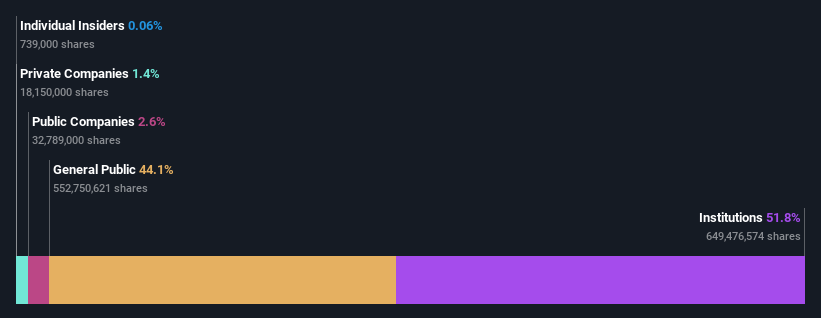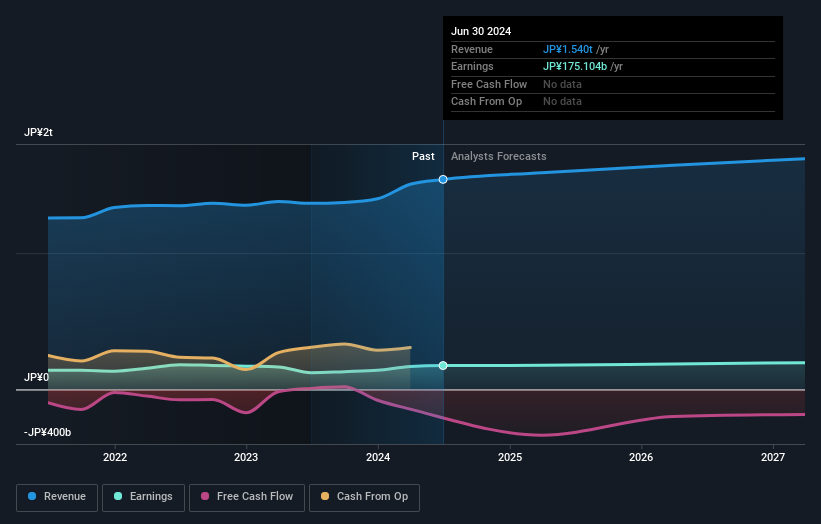- Japan
- /
- Real Estate
- /
- TSE:8802
Institutional investors in Mitsubishi Estate Co., Ltd. (TSE:8802) lost 3.2% last week but have reaped the benefits of longer-term growth

Key Insights
- Given the large stake in the stock by institutions, Mitsubishi Estate's stock price might be vulnerable to their trading decisions
- The top 25 shareholders own 45% of the company
- Ownership research along with analyst forecasts data help provide a good understanding of opportunities in a stock
To get a sense of who is truly in control of Mitsubishi Estate Co., Ltd. (TSE:8802), it is important to understand the ownership structure of the business. We can see that institutions own the lion's share in the company with 52% ownership. In other words, the group stands to gain the most (or lose the most) from their investment into the company.
Institutional investors was the group most impacted after the company's market cap fell to JP¥2.8t last week. Still, the 10% one-year gains may have helped mitigate their overall losses. But they would probably be wary of future losses.
Let's delve deeper into each type of owner of Mitsubishi Estate, beginning with the chart below.
See our latest analysis for Mitsubishi Estate

What Does The Institutional Ownership Tell Us About Mitsubishi Estate?
Institutional investors commonly compare their own returns to the returns of a commonly followed index. So they generally do consider buying larger companies that are included in the relevant benchmark index.
As you can see, institutional investors have a fair amount of stake in Mitsubishi Estate. This can indicate that the company has a certain degree of credibility in the investment community. However, it is best to be wary of relying on the supposed validation that comes with institutional investors. They too, get it wrong sometimes. It is not uncommon to see a big share price drop if two large institutional investors try to sell out of a stock at the same time. So it is worth checking the past earnings trajectory of Mitsubishi Estate, (below). Of course, keep in mind that there are other factors to consider, too.

Investors should note that institutions actually own more than half the company, so they can collectively wield significant power. We note that hedge funds don't have a meaningful investment in Mitsubishi Estate. The company's largest shareholder is BlackRock, Inc., with ownership of 9.7%. In comparison, the second and third largest shareholders hold about 4.3% and 3.7% of the stock.
On studying our ownership data, we found that 25 of the top shareholders collectively own less than 50% of the share register, implying that no single individual has a majority interest.
Researching institutional ownership is a good way to gauge and filter a stock's expected performance. The same can be achieved by studying analyst sentiments. There are plenty of analysts covering the stock, so it might be worth seeing what they are forecasting, too.
Insider Ownership Of Mitsubishi Estate
The definition of company insiders can be subjective and does vary between jurisdictions. Our data reflects individual insiders, capturing board members at the very least. Company management run the business, but the CEO will answer to the board, even if he or she is a member of it.
Insider ownership is positive when it signals leadership are thinking like the true owners of the company. However, high insider ownership can also give immense power to a small group within the company. This can be negative in some circumstances.
Our information suggests that Mitsubishi Estate Co., Ltd. insiders own under 1% of the company. However, it's possible that insiders might have an indirect interest through a more complex structure. It is a very large company, so it would be surprising to see insiders own a large proportion of the company. Though their holding amounts to less than 1%, we can see that board members collectively own JP¥1.7b worth of shares (at current prices). It is good to see board members owning shares, but it might be worth checking if those insiders have been buying.
General Public Ownership
The general public-- including retail investors -- own 44% stake in the company, and hence can't easily be ignored. While this size of ownership may not be enough to sway a policy decision in their favour, they can still make a collective impact on company policies.
Next Steps:
I find it very interesting to look at who exactly owns a company. But to truly gain insight, we need to consider other information, too. Like risks, for instance. Every company has them, and we've spotted 2 warning signs for Mitsubishi Estate (of which 1 is concerning!) you should know about.
If you are like me, you may want to think about whether this company will grow or shrink. Luckily, you can check this free report showing analyst forecasts for its future.
NB: Figures in this article are calculated using data from the last twelve months, which refer to the 12-month period ending on the last date of the month the financial statement is dated. This may not be consistent with full year annual report figures.
New: Manage All Your Stock Portfolios in One Place
We've created the ultimate portfolio companion for stock investors, and it's free.
• Connect an unlimited number of Portfolios and see your total in one currency
• Be alerted to new Warning Signs or Risks via email or mobile
• Track the Fair Value of your stocks
Have feedback on this article? Concerned about the content? Get in touch with us directly. Alternatively, email editorial-team (at) simplywallst.com.
This article by Simply Wall St is general in nature. We provide commentary based on historical data and analyst forecasts only using an unbiased methodology and our articles are not intended to be financial advice. It does not constitute a recommendation to buy or sell any stock, and does not take account of your objectives, or your financial situation. We aim to bring you long-term focused analysis driven by fundamental data. Note that our analysis may not factor in the latest price-sensitive company announcements or qualitative material. Simply Wall St has no position in any stocks mentioned.
About TSE:8802
Mitsubishi Estate
Engages in the real estate activities in Japan and internationally.
Solid track record with mediocre balance sheet.


